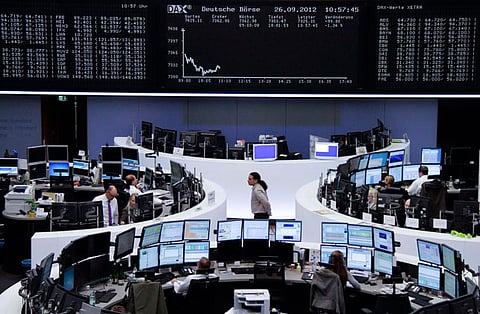Germany bids to curb high-frequency trading
Merkle: We need to regulate, we need oversight, we need measures to minimise the risks

Berlin: German Chancellor Angela Merkel’s cabinet on Wednesday agreed draft laws aimed at putting the brakes on risky high-speed trading, saying it was playing a “pioneering role” for the rest of Europe.
Ministers passed a raft of measures to curb the practice of computerised high-frequency trading, which allows trades to be carried out in fractions of seconds and once caused a sudden trillion-dollar loss on US markets.
“We do not want to ban this or in any way criminalise it but we need to regulate, we need oversight, we need measures to minimise the risks that can arise from this method of trading,” Merkel’s spokesman told reporters.
Regulating such trading, which accounts for up to half the trade on German markets, is a “very important element” of a wider policy of market regulation, the spokesman, Steffen Seibert, told a regular government news conference.
“Germany is playing a pioneering role in this question and is anticipating corresponding legislation at the European level,” added Seibert.
Risks associated with such trades include “extreme and irrational market fluctuations, overburdened trading systems and also the possibility of malpractice,” the finance ministry said in a statement.
According to the draft legislation, high-frequency traders will have to be registered and set up their trading systems in such a way that they cannot lead to glitches on the overall market.
In addition, the government plans to levy a fee on traders who engage in “excessive use of the trading system,” the draft legislation decrees.
Similar legislation is also being discussed in Brussels that could see curbs rolled out over the whole of the European Union.
An association of European traders said it was “comfortable with the general direction and objectives of the proposed German legislation” but criticised Berlin’s pre-emptive action.
“We have grave reservations about individual countries pre-empting Brussels legislation by enacting their own initiatives,” the FIA EPTA association said.
Legislators on both sides of the Atlantic are looking into ways to prevent future disruption after a series of high-profile incidents linked to high-frequency trading.
The “flash crash” of May 6, 2010, when the Dow Jones index plunged 700 points in a matter of minutes, was blamed on one firm’s algorithm selling off 75,000 stocks in 20 minutes, in a computerised trade worth $4.1 billion.
The legislation must now be passed in both German houses of parliament.
But the FIA EPTA association insisted that such a way of trading offered more advantages than disadvantages.
“These types of regulations tend to be driven by emotive and anecdotal evidence as well as populist rhetoric rather than firm evidence,” the group said in a statement.
“The evidence clearly shows that current exchange traded markets offer unprecedented liquidity at very low costs to the end users,” it added.


